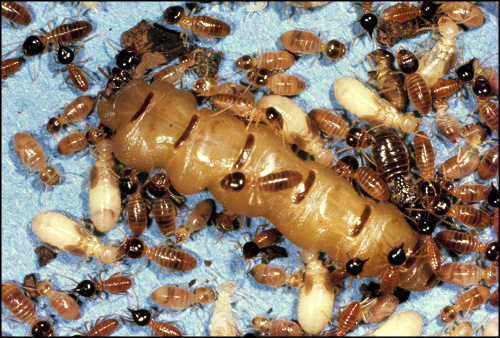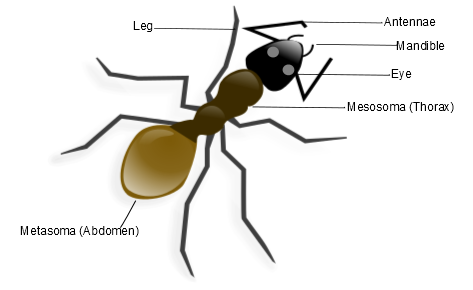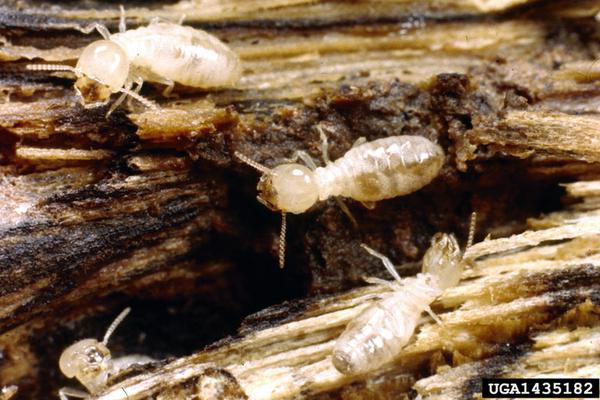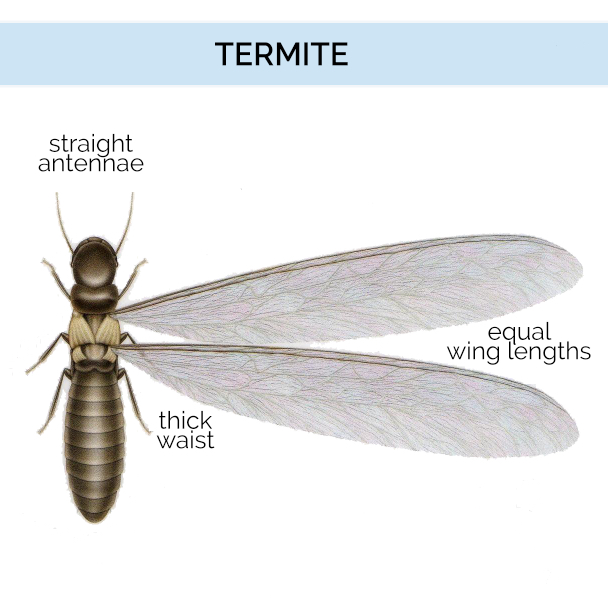Anatomy Of A Termite
The mandible is another term for the termites powerful jaws the primary reason why they are. Termite anatomy in species identification termite anatomy is studied by entomologists mainly because it is an essential key in identifying termite species.
 Isoptera An Overview Sciencedirect Topics
Isoptera An Overview Sciencedirect Topics
When they get in your home however they can cause costly damage.

Anatomy of a termite. Oftentimes ants and termites are mistaken for each other. This understanding of termite biology has led to advancements in termite control products that target termites and only termites. Termites have lived on earth for more than 250 million years and are part of the ecosystem helpful in breaking down rotting wood in the environment.
Queen termites can grow as long as 15 millimeters in length which is bigger than any other termite in their colony. One way to tell if the wood in your home has been infested by subterranean termites is by the appearance of the holes on the damaged wood that appear like a honeycomb. These termites are known for their rapid wood eating abilities which make them the most destructive kinds of termites.
The ants or carpenter ant species just moves the wood out squeezes its moisture out and burrows into the structure to create a colony. Inside the gut of a termite are hundreds of species of microbes like the protist trichonympha agilis which helps the termite to break down wood. The termites actually ingest the wood so the sign of termites in the wood are wood colored or darker brown pellets of excrement.
Termite anatomy termite anatomy consists of a head thorax and abdomen which is similar to other insects. Learn about termite anatomy and other basic termite facts. A look at the anatomy of a termite mandible.
They are not easily detected and can do their dirty work long before a homeowner notices any damage. There you have it these are the parts of the termite that you should pay. Without these microbes termites would not be able to hurt our property.
The soldier is the main caste that is referred to when differentiating between species because most of the time in closely related species the workers and the imagos reproductives are highly similar. The anatomy of a queen termite consists of the antenna head thorax legs and abdomen.
 Termites The Australian Museum
Termites The Australian Museum
 Fig 1 Explosive Backpacks In Old Termite Workers Science
Fig 1 Explosive Backpacks In Old Termite Workers Science
 Termite Queen Facts Information About Queen Termites
Termite Queen Facts Information About Queen Termites
 Suicidal Termites Use Chemical Weapons To Defend Colony
Suicidal Termites Use Chemical Weapons To Defend Colony
![]() Termite Control How To Get Rid Of Termites More
Termite Control How To Get Rid Of Termites More
 About Ants Diagram Basic Electrical Wiring Theory
About Ants Diagram Basic Electrical Wiring Theory
 Termites Biology And Control Nc State Extension Publications
Termites Biology And Control Nc State Extension Publications
 Do Termites Have Eyes Terminix
Do Termites Have Eyes Terminix
 Why Do Termites Follow Ink Vulcan Termite Pest Control
Why Do Termites Follow Ink Vulcan Termite Pest Control
What Do Termites Look Like Termite Web
 The Animal House The Incredible Termite Mound Nature Pbs
The Animal House The Incredible Termite Mound Nature Pbs
 Termite Biological Traits Characteristics Anatomy Life
Termite Biological Traits Characteristics Anatomy Life
 Insects Anatomy Images Stock Photos Vectors Shutterstock
Insects Anatomy Images Stock Photos Vectors Shutterstock
 Termite Control Termite Inspection Winchester Va
Termite Control Termite Inspection Winchester Va
 Blind Snake Reptile Britannica
Blind Snake Reptile Britannica
 The Anatomy Of A Termite Learn About The Nature Of Termites
The Anatomy Of A Termite Learn About The Nature Of Termites
16 Million Year Old Dominican Amber Reveals Springtails
 Bug Insect Lesson Plans For Kids Pestworld For Kids
Bug Insect Lesson Plans For Kids Pestworld For Kids
Ant Exterminators Pest Control Services In Northern
 Termite Feeding And The Protozoa Ppt Download
Termite Feeding And The Protozoa Ppt Download
Termite Pest Insect Simple Black Line Vector Icon Stock
 Anatomy Of A Termite Kama Aina Termite And Pest Control
Anatomy Of A Termite Kama Aina Termite And Pest Control
Termite Simple Black Line Insect Bug Vector Icon Stock
 Termite Head Insect Eyes Insect Anatomy Insects
Termite Head Insect Eyes Insect Anatomy Insects
 What Do Termites Look Like Termite Identification Guide
What Do Termites Look Like Termite Identification Guide



Belum ada Komentar untuk "Anatomy Of A Termite"
Posting Komentar